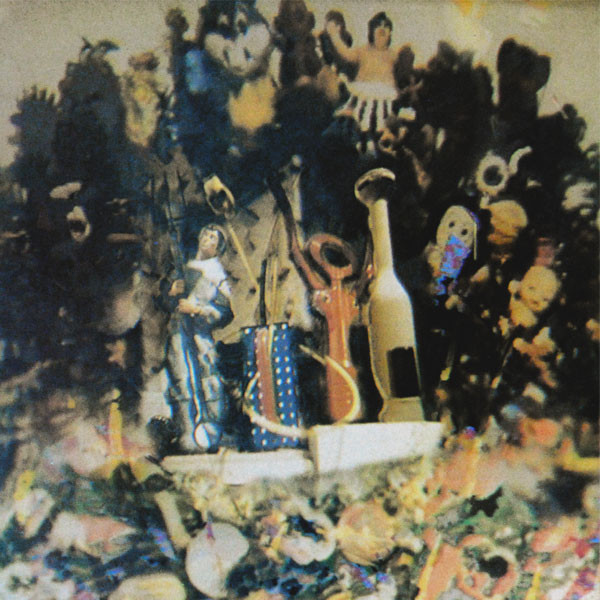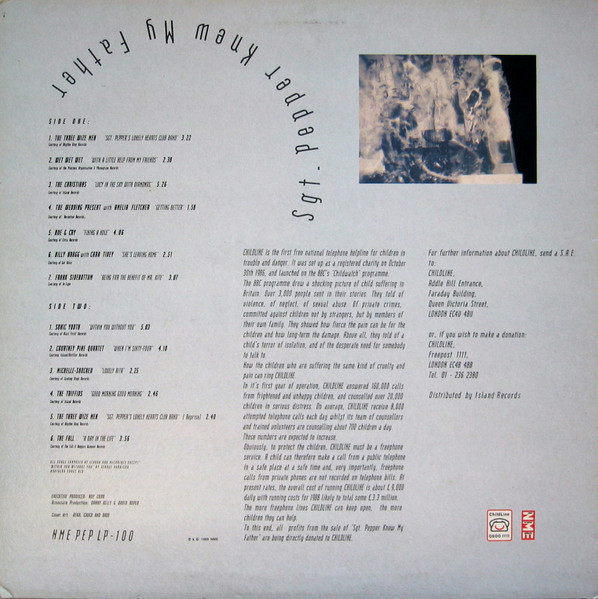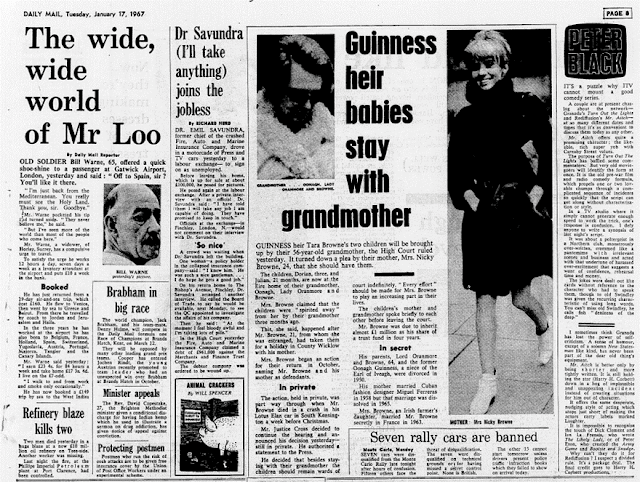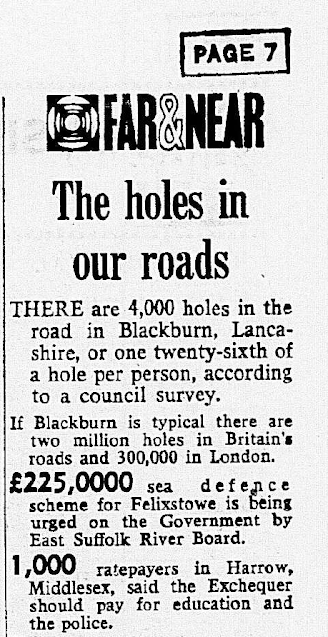Lyrics
The Beatles 1
I read the news today, oh boy 2
About a lucky man who made the grade
And though the news was rather sad
Well, I just had to laugh
I saw the photograph
He blew his mind out in a car
He didn't notice that the lights had changed
A crowd of people stood and stared
They'd seen his face before
Nobody was really sure
If he was from the House of Lords
I saw a film today, oh boy 3
The English Army had just won the war
A crowd of people turned away
But I just had to look
Having read the book
I'd love to turn you on 4
Woke up, fell out of bed 5
Dragged a comb across my head 6
Found my way downstairs and drank a cup
And looking up, I noticed I was late
Found my coat and grabbed my hat
Made the bus in seconds flat
Found my way upstairs and had a smoke 7
And somebody spoke and I went into a dream
I read the news today, oh boy
Four thousand holes in Blackburn, Lancashire 8
And though the holes were rather small
They had to count them all
Now they know how many holes it takes
To fill the Albert Hall 9
I'd love to turn you on
The Fall
I read the news today, oh boy
About a lucky man who made the grade
And though the news was rather sad
Well, I just had to laugh
I saw the photograph
He blew his mind out in a car
He didn't notice that the lights had changed
A crowd of people stood and stared
They'd seen his face before
Nobody was really sure
If he was from the House of Lords
I saw a film today, oh boy
The English army had just won the war
A crowd of people turned away
But I just had to look
Having read the book
I'd love to turn you on
Woke up, fell out of bed
Dragged a comb across my head
Found my way downstairs and drank a cup
And looking up, I noticed I was late
Found my coat and grabbed my stash 10
Made the bus in seconds flat
Found my way upstairs and had a smoke
And nobody spoke ‘cos I went into a dream 11
I read the news today, oh boy
Four thousand holes in Blackburn, Lancashire
And though the holes were rather small
They had to count them all
Now they know how many holes it takes
To fill the Albert Hall
I'd love to turn you on
Commentary
More nonsense has been written about this recording than anything else The Beatles produced.
MacDonald, 2008, p.228
The Fall’s cover of “A Day in the Life” appeared on Sgt. Pepper Knew My Father (released February 1988), a compilation cassette/LP put together by New Musical Express in aid of the charity Childline [Wikipedia]. The album consisted of bands covering songs from The Beatles’ album Sgt. Peppers Lonely Hearts Club Band (1967), which had reached its 21st anniversary.
The song was never played live.


Wet Wet Wet’s cover of “With a Little Help From My Friends” (see Wikipedia), which appeared on the album, was released as a double-A side single with Billy Bragg and Cara Tivey’s version of “She’s Leaving Home”, in May 1988. It spent eleven weeks in the UK charts, four of them at Number One (see Official Charts).
“A Day In The Life”, according to Ian MacDonald, is a “song about perception” – reality having been “revealed by LSD to be largely in the eye of the beholder.” (MacDonald, 2008, p.228).
A song not of disillusionment with life itself but of disenchantment with the limits of mundane perception, A DAY IN THE LIFE depicts the ‘real’ world as an unenlightened construct that reduces, depresses, and ultimately destroys.
MacDonald, 2008, p.229.
It’s perhaps not too far-fetched to say that similar concerns can be found in a number of songs by The Fall.
As recorded in the annotations, The Beatles’ lyric refers to a couple of newspaper reports (inspiring the first and last verses) and the 1967 film How I Won The War, in which Lennon appeared. Here are images of the relevant Daily Mail articles – note that Ian MacDonald got the details wrong.


Ian MacDonald’s account of the lyrical inspiration and textual themes and the circumstances of the recording of “A Day in the Life” is worth reading, despite not being entirely accurate, as of course is the rest of his classic book, Revolution in the Head. I can do no better than refer readers to that for further details of how the track was put together by The Beatles.
For MacDonald, “A Day in the Life” is “the peak of The Beatles’ achievement.”
With one of their most controlled and convincing lyrics, its musical expression is breathtaking, its structure at once utterly original and completely natural.
MacDonald, 2008, p.231.
For The Fall to cover The Beatles at all, let alone for a charity album, seems incongruous.
For a start, Mark E. Smith had never admitted to being a fan of The Beatles. In Renegade, he says,
Everybody goes on about The Beatles, but The Searchers were the main Merseybeat band for me.
Smith, 2008, p.179.
Hilariously, The Fall’s albums Bend Sinister (1986) and The Frenz Experiment (1988) were recorded in part at Abbey Road Studios (where The Beatles recorded Sgt. Peppers Lonely Hearts Club Band). But it was too expensive for the NME to fund the recording of “A Day in the Life” there.
Steve Hanley, in The Big Midweek, explains:
[Simon Rogers] has to put his classically-trained ear to good use and decode Paul McCartney’s bass line in ‘A Day In The Life’, then teach it to me. Mark being an NME darling, when they asked him if we’d like to be on their Sgt. Pepper Knew My Father charity cover album, even though he’s never been a Beatles fan and he’s had severe reservations about Live Aid-type stuff, he readily agreed to us joining the likes of Wet Wet Wet, Hue and Cry, Sonic Youth and Billy Bragg… NME are paying for us to go in a studio for the day but, ironically, even though we’re already at Abbey Road, they can only afford Grant’s studio in Brixton for our Beatles cover.
Hanley and Piekarski, 2014, pp.260-261.
Remarkably, The Fall’s cover sticks quite closely to the original, even down to mimicking the cacophonous orchestral crescendo. There are only two lyrical changes.
Simon Wolstencroft (“I’m not even a massive Beatles fan”) considered the cover to be “pretty true to the original”, and commented that it was “the best cover we did while I was on board.” (Wolstencroft, 2014, p.95)
Interviewed by the fanzine House of Dolls in 1988, Mark E. Smith expressed mixed feelings about The Fall’s involvement with the project.
The Fall’s recent contribution of a track to NME’s Sgt Pepper compilation is bound to raise a few hackles. Surprisingly, Smith can see the inconsistencies himself:
“The whole thing is suspect. People build their careers around charity. We did it also because it was the NME and I thought it would be a decent album. It isn’t. I’ve always hated Sgt Pepper but the track we did was one I liked.”
Morris, 1988, p.23.
A little later, MES reflected on the experience in an interview with the NME‘s James Brown:
What was it like working on a song like The Beatles’ ‘Day In The Life’ that you did for the NME‘s Sgt Pepper LP?
“What? Apart from the spastics producing it, I really enjoyed it, I’ve never been a big fan of theirs (The Beatles) but I do like that song.”
Brown, 1989, p.15.
Footnotes
- I’ve based this rendering of the lyrics on the version published in Campbell & Murphy (1980, p.9). In particular, the line “I’d love to turn you on” stands alone in their version and in mine, and “To fill the Albert Hall” is a line on its own instead of being incorporated into the preceding line. I have however omitted the numbers/counting (lines 17 and 35), “Huh – huh – huh – huh” (line 22) and “Aah! Aah! Aah! (line 27), which they include. And I split “Nobody was really sure” from “If he was from the House of Lords”, mainly to avoid the text wrapping over but partly because I liked the “before” – “sure” rhyme. But this may not be what McCartney and Lennon intended. ↩︎
- Ian MacDonald (2008, p.229), identifies a piece in the Daily Mail of 17 January 1967 (“Guinness heir babies stay with grandmother”, p.3, not identified by MacDonald), concerning the death of Tara Browne. Browne, often described as “Guinness heir Tara Browne”, died in a car crash on 18 December 1966, aged just 21. Browne would have received £1 million from a trust fund had he lived to 25. MacDonald describes him as a “friend of The Beatles and other leading English groups… an enthusiast of the London counterculture and… a user of mind-expanding drugs.”
Curiously, MacDonald appears to think the article was the “report of the coroner’s verdict”, and this is what many commentaries about the song on the Internet also say, but it is incorrect. In fact it was a report about a High Court ruling that Browne’s two children would continue to be brought up by their grandmother, and not by their mother. The custody battle had begun in October 1966 and court proceedings were ongoing when Browne died. Of course it is possible that this section of lyric was based on an earlier report, but in that case it cannot also have been “in the same newspaper” as the Blackburn holes story (see below), as MacDonald has it.
The Browne inquest was actually held on 4 January 1967, and the verdict (“accidental death”) reported by the Mail on 5 January (p.3). ↩︎ - According to Ian MacDonald, Lennon “inserted a verse in which his jaded spectator looks on as the English army wins the war. Prompted by his part in the film How I Won The War three months earlier, this may have been a veiled allusion to Vietnam which, though a real issue to Lennon, would have overheated the song if stated directly.” (2008, pp.229-230). For more on How I Won The War, see Wikipedia. ↩︎
- Lennon credited this line to McCartney (MacDonald, 2008, p.231, note 1). MacDonald: “the sighing tragedy of the verses is redeemed by the line ‘I’d love to turn you on’, which becomes the focus of the song. The message is that life is a dream and we have the power, as dreamers, to make it beautiful.” (2008, p.230). ↩︎
- This verse was written by Paul McCartney. Ian MacDonald again: “McCartney added the double-time middle section, a fragment of a number about his schooldays which, in its new context, became a vignette of a vacantly busy life of routine.” (2008, p.239). ↩︎
- “Head” rhymes with “bed”, which is probably the important thing, but I enjoy the implication that the narrator is balding. ↩︎
- Ian MacDonald records that “smoke” was originally “Woodbine” (a brand of cigarette): “as McCartney and Lennon agreed, ‘Bugger this, we’re going to write a real turn-on song!” (p.230). ↩︎
- “On the next page in the same newspaper, he [Lennon] found an item whose absurdity perfectly complemented the Tara Browne story..” says MacDonald (2008, p.229). As noted in footnote 2, there is no report of the coroners’ verdict on the death of Tara Browne in the Daily Mail of 17 January 1967. Instead, there is a report about the custody battle over his children, which is on p.3. The “holes in Blackburn” story is not on “the next page”. It’s in the “Far & Near” column four pages later (p.7). ↩︎
- The Royal Albert Hall, located in South Kensington (which was also the district of London where Tara Browne died), is a famous British concert hall. It was built in memory of Prince Albert and opened by his widow, Queen Victoria, in 1871 (a decade after his death). See Royal Albert Hall – Wikipedia. ↩︎
- MES substitutes “stash” for “hat”, inserting a more explicit drugs reference into the song than The Beatles did. ↩︎
- MES second lyrical change replaces “somebody spoke and…” with “nobody spoke ‘cos…”. ↩︎
Sources / Links
- Brown, James (1989). “Rebellious Juke-Box”, in New Musical Express, 29 July, p.15.
- Campbell, Colin and Murphy, Allan (1980). Things We Said Today: The Complete Lyrics and a Concordance to The Beatles’ Songs, 1962-1970. Ann Arbor, Michigan: Pierian Press.
- Discogs: Sgt. Pepper Knew My Father (NME PEP LP 100).
- Hanley, Steve and Piekarski, Olivia (2014). The Big Midweek: Life Inside The Fall. Pontefract: Route.
- MacDonald, Ian (2008). “A Day In The Life”, in Revolution in the Head: The Beatles’ Records and the Sixties. London: Vintage. pp.227-232. (This paperback edition is confusingly described as the “third revised edition” on the cover, and the “second revised edition” on the title page).
- Morris, Steve (1988). “Things That Go Bump In The Night”, in House of Dolls, pp.20-23.
- Pringle, Steve (2022). You Must Get Them All: The Fall on Record. [paperback edition]. Pontefract: Route Publishing Ltd. [Online store]
- Smith, Mark E. (2008). Renegade: The Lives and Tales of Mark E. Smith. London: Penguin.
- The Track Record: “A Day In The Life”
- Wikipedia: “A Day in the Life”
- Wikipedia: “Sgt. Pepper Knew My Father”
- Wolstencroft, Simon (2014). You Can Drum But You Can’t Hide. London: Strata Books.


The original ends with a backward tape loop of chatter which people have read much into.
The Fall version ends with a tape loop of people imitating backward talk but talking forward – I hear “will that be the new single then, will that be the new single then”